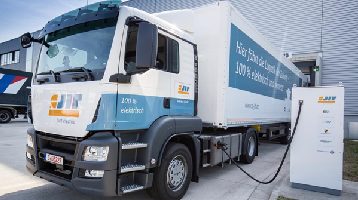
Electric mobility hit the headlines last week. Volvo announced it would only make fully electric or hybrid cars from 2019 onwards, a decision considered to mark the beginning of the end for the combustion engine’s dominance. The following day, France announced it will end sales of petrol and diesel vehicles by 2040. In a yet another ambitious commitment to sustainable transport, Norway announced it will ban petrol powered cars by 2025. The announcements certainly signal an acceleration of the electric car revolution, which according to Bloomberg should result in electric vehicles sales surpassing internal combustion engine sales by 2038.
While the use of electric vehicles in passenger and inner-city transport is on the rise, the deployment of electric vehicles at inter-city level still lags behind. Indeed, the key field of application of electric vehicles in the logistics sector remains urban freight transport, which relies increasingly on the use of electric vans. In this area of logistics, the range of vehicle models is expanding constantly and all the big automobile manufacturers are represented in this segment.
But how feasible is the wider application of electric vehicles in areas other than city logistics? The recent trials conducted by Porsche and VW suggest that electric trucks could work for just-in-time deliveries. The automotive manufacturers successfully tested the use of electric trucks under real conditions in multi-shift operations at their automotive plants in Germany. Porsche Leipzig started electric truck trial for deliveries from the logistics centre at its Liepzig plant in Germany to the nearby assembly supply centre. The trial uses a 40-tonne tractor unit with an electrical drive, which has a top speed of 85 km/h and a range of 70km. Using a 150kW fast charger, the battery will be charged during the planned waiting times while it is being loaded at the supply centre, meaning it can be used in an entire three-shift cycle. This makes Porsche the first automotive manufacturer in Europe to use fully electric 40-tonne trucks suitable for motorway driving. Alongside the project at Porsche Leipzig, Volkswagen Sachsen is testing a second electric truck at its Zwickau plant.
Do these successful trials signal that e-mobility will start to take off in the truck segment? Indeed, as battery and fuel cell technologies advance, so too do the prospects for electric trucks in the logistics industry. With the cost and weight of batteries coming down and the performance going up, electric trucks seem like a more viable proposition. In addition to this, if demand for electric trucks were to rise, this would prompt automotive manufacturers to produce affordable models in series, which in turn would further boost demand.
Along with this, the constant improvement of the charging infrastructure in Europe should also work as an enabler of the proliferation of electric trucks. Charging infrastructure in Europe has grown since 2013 at a rate of 30% to 60% a year in order to keep up with a growing electric vehicle market share. Trials in overhead power lines on highways are also under way in Germany and Sweden. Europe’s auto manufacturers have also recognised their own interest in supplying motorways with the chargers that their electric fleets require. For instance, BMW, Daimler, Ford, and Volkswagen announced their intention to install thousands of electric vehicles fast chargers along European motorways.
All of these developments suggest that it is no longer a question of if, but a question of when electric trucks will become a technologically and economically effective way to move goods at the inter-city level. However, until the investment plans for the service network materialise, electric trucks will remain suitable only for shorter-run applications, i.e. for regional and short-haul segments. But overall, with all the barriers that are specific to electric mobility, there is still much scope for new applications of this technology in the logistics industry.
Ti’s latest report, Global Contract Logistics 2017, contains a detailed analysis of the challenges facing electric vehicles, as well as other alternative fuels. For more information regarding the report, please contact Michael Clover on +44 (0)1666 519907 or email [email protected].
Source: Transport Intelligence, July 11, 2017
Author: Violeta Keckarovska